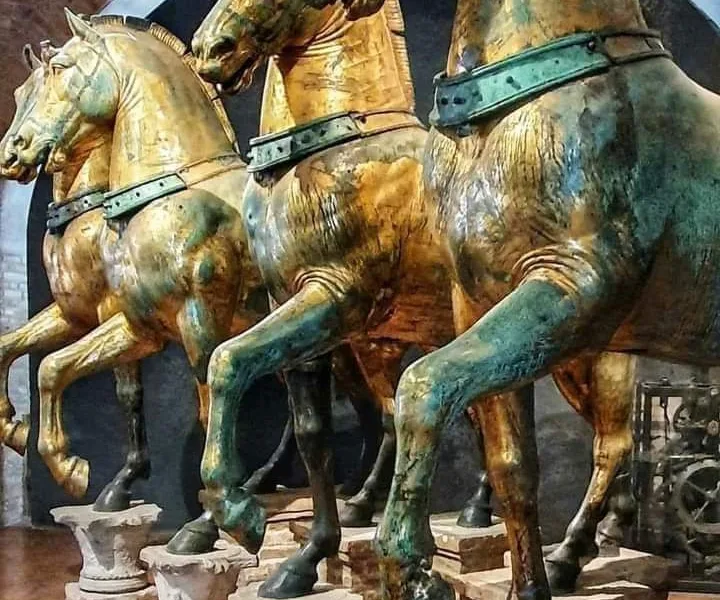The stolen ancient Greek masterpiece from the sculptor Lysippos!
The horse sculptures come from the island of Chios (the fifth largest of the Greek islands).
Since four horses and a quadriga (a type of chariot that was also used in the Ancient Olympic Games) were mentioned in the Parastaseis syntomoi chronikai, more commonly called "brief Historical Notes" text dated from the 8th or ninth century. The horses stayed there until 1204 when they were looted by Venetian forces as part of the sack of the capital of the Byzantine Empire in the Fourth Crusade. Interestingly, the collars on the horses' necks that you can see in the photos below were added around this time to cover the areas where their necks and heads had been removed to allow them to be transported from Constantinople to Venice.
The horse sculptures come from the island of Chios (the fifth largest of the Greek islands). Since four horses and a quadriga (a type of chariot that was also used in the Ancient Olympic Games) were mentioned in the Parastaseis syntomoi chronikai, more commonly called "brief Historical Notes" text dated from the 8th or ninth century. The horses stayed there until 1204 when they were looted by Venetian forces as part of the sack of the capital of the Byzantine Empire in the Fourth Crusade. Interestingly, the collars on the horses' necks that you can see in the photos below were added around this time to cover the areas where their necks and heads had been removed to allow them to be transported from Constantinople to Venice.
Soon after the Fourth Crusade, Doge Enrico Dandolo (Doge meaning a civil officer or lay judge in Venice or Genoa) sent the horses to Venice, where they were installed on the terrace of the facade of St. Mark's Basilica in 1254.
In 1797, Napoleon forcibly removed the horses from the basilica and carried them off to Paris, where they were used in the design of the Arc de Triomphe du Carrousel together with a quadriga.
In 1815, the horses were returned to Venice by Captain Dumaresq, who had fought at the Battle of Waterloo and along with the allied forces in Paris. He was selected by the Emperor of Austria to take the horses down from the Arc de Triomphe and return them to their original place at St. Mark's in Venice. For doing an excellent job bringing the horses back to Venice, the Emperor gave him a gold snuff box with his initials in diamonds on the lid.
Until the early 1980s, the horses remained untouched above St. Mark's. But with growing air pollution that would make the statues deteriorate quicker, they were removed and brought inside St. Mark's and can still be seen inside the basilica. They were replaced with exact copies that can be seen outside.


